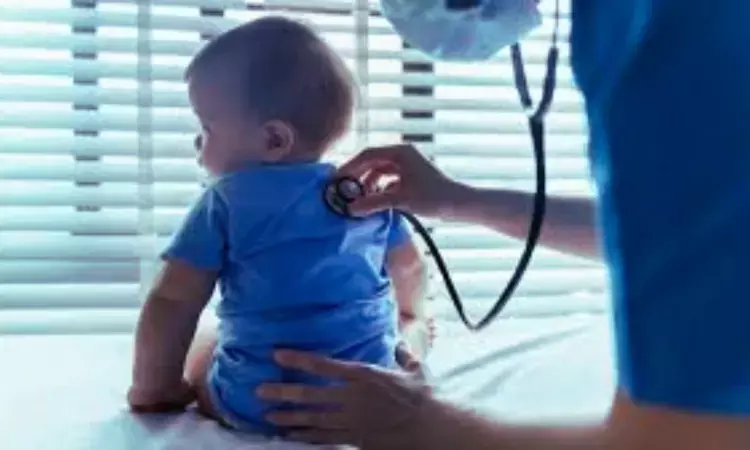- Home
- Medical news & Guidelines
- Anesthesiology
- Cardiology and CTVS
- Critical Care
- Dentistry
- Dermatology
- Diabetes and Endocrinology
- ENT
- Gastroenterology
- Medicine
- Nephrology
- Neurology
- Obstretics-Gynaecology
- Oncology
- Ophthalmology
- Orthopaedics
- Pediatrics-Neonatology
- Psychiatry
- Pulmonology
- Radiology
- Surgery
- Urology
- Laboratory Medicine
- Diet
- Nursing
- Paramedical
- Physiotherapy
- Health news
- Fact Check
- Bone Health Fact Check
- Brain Health Fact Check
- Cancer Related Fact Check
- Child Care Fact Check
- Dental and oral health fact check
- Diabetes and metabolic health fact check
- Diet and Nutrition Fact Check
- Eye and ENT Care Fact Check
- Fitness fact check
- Gut health fact check
- Heart health fact check
- Kidney health fact check
- Medical education fact check
- Men's health fact check
- Respiratory fact check
- Skin and hair care fact check
- Vaccine and Immunization fact check
- Women's health fact check
- AYUSH
- State News
- Andaman and Nicobar Islands
- Andhra Pradesh
- Arunachal Pradesh
- Assam
- Bihar
- Chandigarh
- Chattisgarh
- Dadra and Nagar Haveli
- Daman and Diu
- Delhi
- Goa
- Gujarat
- Haryana
- Himachal Pradesh
- Jammu & Kashmir
- Jharkhand
- Karnataka
- Kerala
- Ladakh
- Lakshadweep
- Madhya Pradesh
- Maharashtra
- Manipur
- Meghalaya
- Mizoram
- Nagaland
- Odisha
- Puducherry
- Punjab
- Rajasthan
- Sikkim
- Tamil Nadu
- Telangana
- Tripura
- Uttar Pradesh
- Uttrakhand
- West Bengal
- Medical Education
- Industry
AAP Recommends Nirsevimab to Protect Infants Against Severe RSV: Monoclonal Antibody Gains Traction

USA: The American Academy of Pediatrics (AAP) has released recommendations for the use of the monoclonal antibody nirsevimab for the prevention of respiratory syncytial virus (RSV) disease. Nirsevimab was recently approved by the FDA and recommended by the CDC.
The AAP recommends that all infants younger than 8 months receive nirsevimab to prevent severe diseases from respiratory syncytial virus. It is also recommended for infants and children aged 8 through 19 months who are at increased risk of severe RSV disease and entering their second RSV season, including those recommended by the AAP to receive palivizumab.
The recommendation aligns with the CDC's (Centers for Disease Control and Prevention) recommendations for the monoclonal antibody, which were made a few weeks ago.
Nirsevimab received approval from the US FDA (Food and Drug Administration) in July to administer to children during their initial RSV seasons.
These recommendations extend to infants suggested by the AAP to receive the monoclonal antibody palivizumab. Notably, children who receive nirsevimab should not be given palivizumab within the same RSV season.
RSV infections surged in the US last year, exacerbating the challenges posed by the ongoing COVID-19 pandemic. The common respiratory virus poses a significant threat to both young children and older adults. While nirsevimab isn't a vaccine, it's designed to prepare the immune system to fight RSV. The timing of this recommendation is crucial, as RSV activity typically intensifies from late fall through spring.
The CDC is working on making nirsevimab available for free to uninsured or underinsured children through the Vaccines for Children program. AAP President Sandy Chung emphasizes the importance of equitable distribution and access to nirsevimab. For families in lower-income and under-resourced communities, accessing this protection can be challenging without adequate support.
With the surge in RSV infections, the AAP's guidance regarding nirsevimab offers a promising tool to combat severe RSV disease in infants and young children. However, infrastructure support and accessibility are key concerns that need to be addressed to ensure that all infants, regardless of their socio-economic status, can benefit from this breakthrough in RSV prevention.
As RSV remains a serious concern, the AAP's recommendation for nirsevimab serves as a significant step towards safeguarding the health of infants and young children. Ensuring equitable access and affordability will be pivotal in preventing severe RSV disease and its associated complications. Paediatricians and health officials are united in their efforts to make this innovative protection widely available and accessible.
Reference:
American Academy of Pediatrics recommends medication to prevent RSV be given to all infants and urges equitable access. https://www.aap.org/en/news-room/news-releases/aap/2023/american-academy-of-pediatrics-recommends-medication-to-prevent-rsv-be-given-to-all-infants-and-urges-equitable-access/. Published Aug. 15, 2023. Accessed Aug. 16, 2023.
Dr Kamal Kant Kohli-MBBS, DTCD- a chest specialist with more than 30 years of practice and a flair for writing clinical articles, Dr Kamal Kant Kohli joined Medical Dialogues as a Chief Editor of Medical News. Besides writing articles, as an editor, he proofreads and verifies all the medical content published on Medical Dialogues including those coming from journals, studies,medical conferences,guidelines etc. Email: drkohli@medicaldialogues.in. Contact no. 011-43720751


